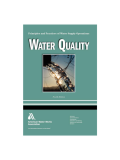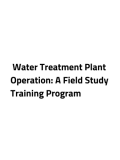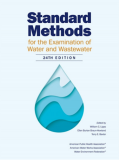Georgia Public Water Supply System Operator Class III License
The Public Water Supply System Operator Class III allows you to do the following work:
- Operate systems of:
- Valves
- Pipes
- Pumps
- Apparatus used to distribute water to the public
How to Get the Public Water Supply System Operator Class III License in Georgia?
Fulfill one of the following combinations of education and experience requirements:
- Option 1:
- High School Diploma, or General Equivalency Diploma
- 36 months of work experience
- Option 2:
- Accredited Associate Degree in Biology, Chemistry, or, at the Board's discretion, other degrees containing sufficient courses in biology or chemistry
- 30 months of work experience
- Option 3:
- Accredited Bachelor of Science Degree in Biology, Chemistry, or, at the Board's discretion, other degrees containing sufficient courses in biology or chemistry
- 24 months of work experience
- Option 1:
- Complete the 40-hour basic water operator course
- Submit a completed and notarized Application Form with the corresponding fee
- Present the following documents along with the application form:
- High School/GED /College Transcript
- Experience Dates
- Job Description
- Disciplinary Action/Sanctions (if applicable)
- Court Documents
- Letter of Explanation
- Secure & Verifiable Documents
- Affidavit of Citizenship
- Immigration Documents (If applicable)
- Background Check (If applicable, it can be obtained at the local law enforcement office)
- Background Consent Form (If applicable)
- Submit the application along with the required documents to the Board at:
Board of Examiners for Certification of Water and Wastewater Treatment Plant Operators and Laboratory Analysts
237 Coliseum Dr.,
Macon, GA 31217 - Take and pass the trade examination administered by AMP/PSI©
- Expect an answer from the Georgia Board of Examiners for Certification of Water & Wastewater Treatment Plant Operators and Laboratory Analysts after the License approval
Georgia Public Water Supply System Operator Class III License Exam Prep Course
Georgia Public Water Supply System Operator Class III License Exam
Below is all the information related to the trade exam, including the official reference list.
Georgia Public Water Supply System Operator Class III Trade Exam
- Testing Method: Computer-based testing; closed book
- Testing Company: PSI©
- Number of Questions: 100
- Types of Questions: Multiple Choice
- Subjects Involved (No. of Questions):
Treatment Process (30)
Calculate and/or record:
- Plant residuals
- Backwash water
- Daily flow rates
- Chemical levels and previous days usage
- Filter performance data
- Online analyzers data
- Calculate chemical dosages
- Interact with HMI and Supervisory Control and Data Acquisition (SCADA)
- Determine correct disinfectant dosage and contact time to maintain desired level of residual in system
- Control treatment plant processes, chemical dosages, and equipment used to treat water
- Determine and adjust plant flows to meet system demands
- Troubleshoot malfunctions and problems in plant process and equipment
- Identify trends and abnormal operation in plant processes by interpreting data from gauges, meters, charts, and graphs
- Interpret facility and process control water meters
Maintain records of operation of treatment facilities:
- Daily testing logs
- Daily equipment logs
- Daily intake and production
- Daily maintenance management reports and notes
- Microbiological sampling and testing
- Make appropriate changes in plant processes to optimize performance and efficiency
- Mix batches of chemical solutions
- Add chemicals to hoppers and feed equipment
- Monitor filter performance and backwash filters
- Monitor the transmission and distribution system
Monitor, evaluate, and adjust:
- Pre-treatment
- Coagulation and flocculation (e.g., flocculation tanks, rapid mix units)
- Clarification and sedimentation (e.g., inclined plate, tube, upflow solids contact)
- Filtration (e.g., biofiltration, diatomaceous earth filters, direct and conventional filtration, membranes, microscreens, slow sand, greensand, pressure, upflow, rapid sand, cartridge)
- Residuals disposal (e.g., lagoons, sludge drying beds, land application, on-site disposal, solids composting)
- Backwash aids
- Source water treatment (e.g., copper sulfate, aeration, mixing)
- Iron/manganese treatment
- Lime-soda ash softening
- Granular activated carbon
- Powdered activated carbon
- Ion exchange
- Chemical feed pumps
- Online instrumentation
- Operate and control electric motors, pumps, and valves to regulate flow of water at the treatment facility
- Perform calculations related to process monitoring
Ensure the proper handling, storage, and use of chemicals:
- Acids
- Bases
- Oxidants
- Coagulants
- Polymers
- Chemical disinfectants
- Fluoride
- Corrosion control chemicals
Laboratory Analysis (13)
- Calibrate and repair laboratory instrumentation to ensure proper operation
- Collect water samples
- Perform sample preservation and documentation for laboratory samples
- Perform lab tests, record results, and interpret data
- Use equipment to evaluate water quality
- Perform analyses:
- Color
- Taste and odor
- Turbidity
- Free Cl2 residual
- Total Cl2 residual
- Fluoride
- pH
- Hardness
- Aluminum
- Alkalinity
- Iron
- Manganese
- Temperature
- Bacteria
- Jar test
- Zeta potential
Equipment Operation & Maintenance (23)
- Adjust pumps to meet demand
- Measure and analyze filter media to determine compliance with design specifications
- Perform facility start up and shut down per SOP
- Calibrate in-line instrumentation (e.g., pH, turbidimeters, Cl analyzer)
- Complete equipment maintenance and repair records, including work orders
- Update asset management log (e.g., CMS)
Ensure the operation and maintenance of equipment at the water treatment facility:
- Chlorine disinfection system
- Filter systems (e.g., biofiltration, diatomaceous earth filters, direct and conventional filtration, membranes, microscreens, slow sand, greensand, pressure, upflow, rapid sand, cartridge)
- Clarifier
- Treated water storage tanks
- Clearwell
- Programmable Logic Control (PLC) System
- Supervisory Control and Data Acquisition (SCADA)
- Polymer feed system
- Raw and treated water pumping systems
- Raw water screening
- Water intake equipment
- Pumps
- Chemical feed equipment
- Chemical mixing equipment (e.g., rapid mix, flocculators, static mixers)
- Water quality analyzers
- Valves
- Injectors
- Evaluate filter operation by performing filter surveillance tests
- Inspect, exercise, and maintain valves
- Maintain facility and process control water meters
- Install and maintain facility piping (e.g., air, water, chemical)
- Lubricate pumps, motors, chains, conveyors, and other machinery and equipment
- Operate and maintain pumps, drivers, and auxiliary equipment
- Operate and maintain onsite backup power generator
- Perform calibration of chemical feeders
- Perform efficiency tests on pumps and related equipment (e.g., pump curves)
Perform preventive and corrective maintenance to the auxiliary water treatment plant equipment:
- Electric motors
- Engines
- Gas and electric powered pumps
- Air compressors
- Emergency systems
- Power generation systems
- Pressure and flow regulators
- Online analyzers
- Filters (e.g., air, oil)
- Chemical feed systems
- Perform routine maintenance of grounds machinery, structures, equipment, and piping systems (e.g., cleaning, painting)
- Perform inspections on clear well covers, hatches, access covers, vents, and overflows
- Backwash filters
Source Water Characteristics (10)
- Evaluate the following source water characteristics:
- Biological (bacterial, protozoa, viruses)
- Chemical
- Potential sources of source water contamination
- Physical
- Measure static water level and pumping levels of wells
- Measure and monitor raw water source
- Perform inspections of surface water sources and report any issues that may affect water quality (e.g., non-native plant species, mussels, algae, erosion)
- Perform inspections of ground water well sites and report any issues that may affect water quality (e.g., contamination, flooding, well head protection)
- Perform raw water reservoir inspection, maintenance, and cleaning
- Determine if wells are under the direct influence of surface water (GWI)
- Monitor lake stratification
- Educate community on source water protection and conservation
- Evaluate the following source water characteristics:
Security, Safety, Compliance, & Administrative Procedures (24)
- Accept chemical shipments
- Advise on need to order chemicals, repair parts, and tools
- Advise system staff and/or contractors of potential problems and alarms
- Prepare budget for chemicals, laboratory reagents, and equipment
- Inspect plant safety equipment (e.g., fire extinguishers, AED, smoke and gas detectors)
- Comply with safety requirements of the facility and actively promote safe work practices
- Conduct tours of facilities
- Develop and maintain standard operating procedures
- Determine materials, labor, and cost needed for operation, maintenance, and repairs
- Procure materials, labor, and cost needed for operation, maintenance, and repairs
- Investigate consumer complaints regarding water quality and take remedial action
- Take delivery of chemicals by unloading by hand or with equipment such as fork lifts and cranes (e.g., chlorine cylinders, bulk liquids, dry bagged chemicals)
- Inspect chemical containers and security tags before taking delivery (e.g., review SDSs)
- Comply with lock-out tag-out procedures
- Determine if water quality violations have occurred
- Ensure compliance with regulatory agency standards
- Manage safety and environmental issues in compliance with appropriate regulatory agencies (e.g., Hazardous Waste Disposal, Air Quality Standards)
- Monitor and control residual effluents to comply with regulatory permit limits
- Monitor the use of energy and chemicals
- Complete monthly reports
- Track and maintain inventory (e.g., equipment, chemical, general supplies)
- Evaluate operating records and trends
- Maintain facility operation records
- Conduct confined space entries according to appropriate regulatory guidelines
- Notify the public when reportable maximum contaminant levels are exceeded
- Perform facility and perimeter security checks
- Use, handle, and dispose of chemicals according to safety standards
- Perform safety procedures (e.g., calibration of atmospheric testing devices, chemical hazards and chemical spill response, pathogens, Personal Protective Equipment)
Perform supervisory duties:
- Determining and assigning work schedules and tasks
- Enforcing policies and safety procedures
- Conducting performance evaluations
- Resolving grievances
- Making appropriate hiring decisions
- Initiating, investigating, and implementing disciplinary actions
- Coordinating schedule to ensure that plant resources are being utilized to achieve project specific objectives
Plan water treatment operations:
- Production
- Treatment and storage
- Budgeting
- Project management
- Contract management
- Capital improvement planning
- Asset management
- Review and update facility emergency response plans
- Respond to emergencies (e.g., facility upset, major spill response, natural disasters, system contamination)
- WPI Public Water Supply System Operator Class III Official Content Outline
Georgia Public Water Supply System Operator Class III Book Set
This set of books includes all required references for the Public Water Supply System Operator Class III exam. Orders placed before 2 PM are shipped the same day via UPS and a tracking number is emailed before 3 PM.
GEORGIA PUBLIC WATER SUPPLY SYSTEM OPERATOR CLASS III - BOOK SET WITHOUT TABS INCLUDES ALL BOOKS FOR TRADE AND BUSINESS EXAMS
Sales price: $2,248.41-
GEORGIA PUBLIC WATER SUPPLY SYSTEM OPERATOR CLASS III - BOOK SET WITH TABS INCLUDES ALL BOOKS FOR TRADE AND BUSINESS EXAMS
Sales price: $2,348.41
Georgia Public Water Supply System Operator Class III Exam Books
Books Not Allowed in Testing
-
The WSO Water Treatment Series is a comprehen...Water Treatment Series Grades 1 2 3 4
r1523 1$331.99$331.99 -
The WSO: Water Distribution Series (Grades 1,...Water Distribution Series Grades 1 2 3 4
r1524 1$331.99$331.99 -
Basic Science Concepts and Applications is a ...Basic Science Concepts and Applications
r1510 1$209.94$209.94 -
Designed as a certification study text and an...Water Distribution Operator Training Handbook
r1525 1$154.66$154.66 -
This book provides the fundamental principles...Water Quality
r1316 1$20.00$20.00 -
"Principles and Practices of Water Supply Ope...Water Sources
r1511 1$24.21$24.21 -
The safety and reliability of a utility's wat...A Field Guide
r1512 1$105.33$105.33 -
The Security Vulnerability Self Assessment Gu...Security Vulnerability Self Assessment Guide
r1513 1$20.00$20.00 -
This comprehensive training manual equips uti...Effective Utility Leadership Practices
r1514 1$93.39$93.39 -
This book serves as a comprehensive guide for...Small Water System Operation and Maintenance
r1515 1$148.89$148.89 -
Organizing and managing utilities is crucial ...Utility Management
r1516 1$130.98$130.98 -
The Office of Water Programs, run by Universi...Water Treatment Plant Operation. A Field Stud
r1318 1$20.00$20.00 -
This book is a practical and comprehensive gu...Field Study Training Program Volume II
r1319 1$176.52$176.52 -
This book provides a comprehensive and detail...Standard Methods for the Examination of Water
r1312 1$480.51$480.51















